Janice Hardy's Blog, page 68
August 12, 2019
4 Ways to Write a Better Novel
 By Janice Hardy, @Janice_Hardy
By Janice Hardy, @Janice_Hardy Writing a strong novel is about more than technical skills. It’s about storytelling.
I’d gather most writers started writing because they love to tell stories. Characters speak to them, worlds unfold in the their minds, and they see struggles to overcome problems and want to explore those problems. They want to share the amazing things they imagine.
Luckily, this is also why readers pick up a novel. They want to see what adventures we’ve dreamed up and what exciting tales we have to tell. They want to lose themselves in our worlds and characters same as we did.
When those two goals align, a book becomes magic. When they don’t, it sits unread and unappreciated on a shelf, or even a hard drive. And nobody wants that, least of all writers.
Continue ReadingWritten by Janice Hardy. Fiction-University.com
Published on August 12, 2019 05:49
August 11, 2019
Sunday Writing Tip: Check Your Subtext: Say More with Less
 By Janice Hardy, @Janice_Hardy
By Janice Hardy, @Janice_Hardy Each week, I’ll offer a tip you can take and apply to your WIP to help improve it. They’ll be easy to do and shouldn’t take long, so they’ll be tips you can do without taking up your Sunday. Though I do reserve the right to offer a good tip now and then that will take longer—but only because it would apply to the entire manuscript.
This week, look for moments that would be stronger by not stating the emotions and/or thoughts outright.
Subtext is a powerful tool, but also a tricky one, especially in an early draft when we’re still trying to figure out the story. But often, what’s not being said has far more impact on the reader. Good subtext can heighten tensions, create conflict, and even deepen characterization.
Take some time today to look for scenes that could benefit from a little less clarity about how the characters feel and what they think. Rewrite those moments so the subtext carries those emotions and thoughts instead.
Continue ReadingWritten by Janice Hardy. Fiction-University.com
Published on August 11, 2019 05:05
August 10, 2019
Real Life Diagnostics: Would You Keep Reading This Contemporary Women’s Fiction?
 Critique By Janice Hardy, @Janice_Hardy
Critique By Janice Hardy, @Janice_HardyReal Life Diagnostics is a weekly column that studies a snippet of a work in progress for specific issues. Readers are encouraged to send in work with questions, and we diagnose it on the site. It’s part critique, part example, and designed to help the submitter as well as anyone else having a similar problem.
If you're interested in submitting to Real Life Diagnostics, please check out these guidelines.
Submissions currently in the queue: Zero
Please Note: As of today, RLD slots are open.
This week’s questions:
1. Is the protagonist likable? Is she sympathetic?
2. Does her personality come through? Does she have a clear voice?
3. Is the revelation of her skin condition too blunt? Too out-of-the-blue? Should it be posed in a different way?
4. Does the use of fictional brand names clash with using real ones? Is there a rule or a danger to using brand names?
5. Does this work for the first 250 words? Would you read on?
6. Is there anything that stands out negatively to you? Is there anything that can be improved?
Market/Genre: Contemporary Women’s Fiction
On to the diagnosis…
Continue ReadingWritten by Janice Hardy. Fiction-University.com
Published on August 10, 2019 05:55
August 9, 2019
Instilling Wonder in Your Fiction
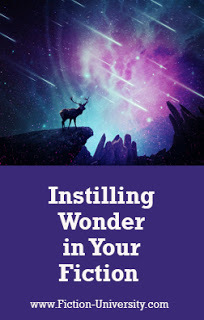 By Julie E. Czerneda, @julieczerneda
By Julie E. Czerneda, @julieczerneda Part of the How They Do It Series
JH: Stories have a way of sweeping readers into another world, and this is particularly true in genre fiction. Creating a sense of wonder helps pull readers into our stories. Julie E. Czerneda visits the lecture hall to day to share tips on how to put the wonder in our fiction.
For twenty years, Canadian author/former biologist Julie E. Czerneda has shared her curiosity about living things through her science fiction and fantasy. The first installments of her Night’s Edge series (DAW) A Turn of Light and A Play of Shadow , won consecutive Aurora Awards (Canada’s Hugo) for Best English Novel. Julie’s edited/co-edited sixteen anthologies of SF/F, two Aurora winners. The Gossamer Mage is Julie’s twentieth novel published by DAW Books, and she couldn’t be more proud to belong to this esteemed publishing family.
Website | Goodreads | Facebook | Twitter |
Take it away Julie…
Continue ReadingWritten by Janice Hardy. Fiction-University.com
Published on August 09, 2019 04:27
August 8, 2019
Writers: Give Your Creativity a Boost
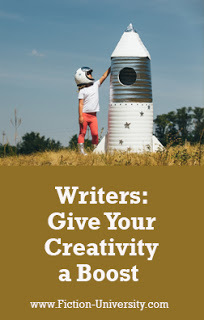 By Shanna Swendson, @ShannaSwendson
By Shanna Swendson, @ShannaSwendsonPart of The Writer’s Life Series
JH: We can't always tap into our creativity on demand, and it's a good idea to engage in activities that help refill our creative wells. This month, Shanna Swendson shares tips on boosting your creativity.
Shanna Swendson earned a journalism degree from the University of Texas but decided it was more fun to make up the people she wrote about and became a novelist. She’s written a number of fantasy novels for teens and adults, including the Enchanted, Inc. series and the Rebel Mechanics series. She devotes her spare time to reading, knitting, and music.
Website | Twitter | Facebook | Goodreads
Take it away Shanna…
Continue ReadingWritten by Janice Hardy. Fiction-University.com
Published on August 08, 2019 04:27
August 6, 2019
How to Write A Real-Page Turner, Part 3
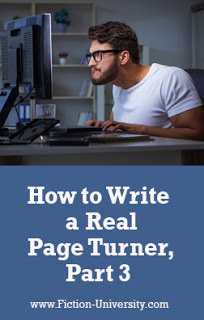 By Laurisa White Reyes, @lwreyes
By Laurisa White Reyes, @lwreyesPart of the How They Do It Series
JH: Laurisa White Reyes continues her How to Write a Page-Turner series today a sure-fire page-turner technique to keep readers hooked in your story.
Laurisa White Reyes is the Senior Editor of Skyrocket Press & Author Services. She has published sixteen books, including 8 Secrets to Successful Self-Publishing and the SCBWI Spark Award winner The Storytellers . Laurisa also provides personal coaching for writers. To connect with her, visit Skyrocket Press.
Website | Facebook | Twitter | Goodreads |
Take it away Laurisa...
Continue ReadingWritten by Janice Hardy. Fiction-University.com
Published on August 06, 2019 05:13
August 2, 2019
First vs. Third Person: Choosing the Right Point of View for Your Novel
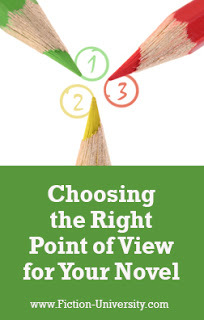 By Janice Hardy, @Janice_Hardy
By Janice Hardy, @Janice_Hardy This week's Refresher Friday takes an updated look at choosing between a first and third person point of view and how point of view can even help with developing your characters.
Point of view is one of the strongest tools a writer has in their toolbox, because a story can drastically change just by changing who's telling it and how they feel about those events. Like witnesses to an event who all see something different.
The wrong point of view can even hurt an otherwise great story, because a character might be too far from the story's events to make a good point of view character. They might even be too close and not able to give the proper perspective needed for that particular tale.
It's an important choice to make in any story.
Continue ReadingWritten by Janice Hardy. Fiction-University.com
Published on August 02, 2019 04:00
August 1, 2019
The Misunderstanding of Write What You Know
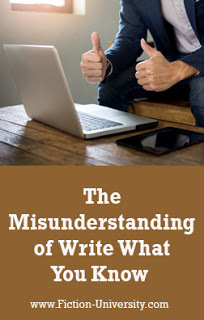 By Harrison Demchick, @HDemchick
By Harrison Demchick, @HDemchickPart of The Writer's Life Series
JH: Some writing advice has been around a long, long time, and write what you know is one of them. Harrison Demchick returns to the lecture hall today to share thoughts on how to make write what ypu know work for you.
Harrison Demchick came up as a book editor in the world of small press publishing, working along the way on more than seventy published novels and memoirs, several of which have been optioned for film. An expert in manuscripts as diverse as women’s fiction, literary fiction, mystery, young adult, science-fiction, fantasy, memoir, and everything in-between, Harrison is known for quite possibly the most detailed and informative editorial letters in the industry—if not the entire universe.
Harrison is also an award-winning screenwriter whose first feature film, Ape Canyon , is currently in post-production. He’s the author of literary horror novel The Listeners (Bancroft Press, 2012), and short stories “Magicland” and “The Bead” appear, respectively, in literary magazines Phantom Drift: A Journal of New Fabulism (January 2019) and The Hunger (Winter 2019). He’s currently accepting new clients for book editing in fiction and memoir at the Writer’s Ally.
Take it away Harrison...Continue ReadingWritten by Janice Hardy. Fiction-University.com
Published on August 01, 2019 05:38
July 31, 2019
Writing and the Debut Author Experience
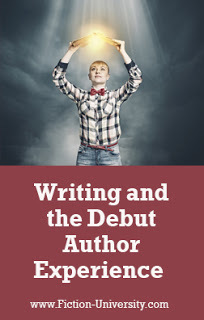 By Evan Ramzipoor @ER_Ramzipoor and Noelle Salazar @noelle_salazar
By Evan Ramzipoor @ER_Ramzipoor and Noelle Salazar @noelle_salazar Part of The Writer's Life Series
JH: We have something a little different and fun today. I don’t do many author interviews here, but from time to time, I have authors (and agents and editors), who interview each other.
Evan Ramzipoor and Noelle Salazar first met at Book Expo America: two wide-eyed first-time authors signing their World War II novels at the same table. Evan’s book The Ventriloquists , forthcoming on August 27, is about ragtag resistance fighters who risk everything to pull an elaborate prank on the Nazis. Noelle’s book The Flight Girls , which was released a few short weeks ago, follows a group of pilots in the Women Airforce Service Pilots program as they fight for their country and the people they love.
The two authors interviewed each other on the craft of writing and the debut author experience.
Take it away Evan and Noelle…
Continue ReadingWritten by Janice Hardy. Fiction-University.com
Published on July 31, 2019 05:05
July 30, 2019
Writing Emotional Truth—What Gets Us There?
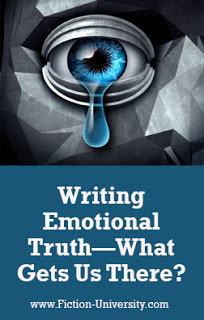 By Bonnie Randall
By Bonnie Randall Part of the How They Do It Series
JH: For many writers, (but not all), we want to tap into the emotional truth of our stories, and our characters. Bonnie Randall is back this month to share tips on getting to the emotional truth in our stories.
Emotional truth. It is an indistinct quality; nebulous, indirect, and implicit between the lines of our prose. It is also—in my opinion—the difference between good writing and great writing. The contrast between cardboard, out-of-sync characters, and living, breathing beings with whom your relationship continues long after you’ve read the last page.
Emotional truth can be difficult to capture, and impossible to master, but there are tricks that can help make it easier to weave into your fiction.
Continue ReadingWritten by Janice Hardy. Fiction-University.com
Published on July 30, 2019 05:01



